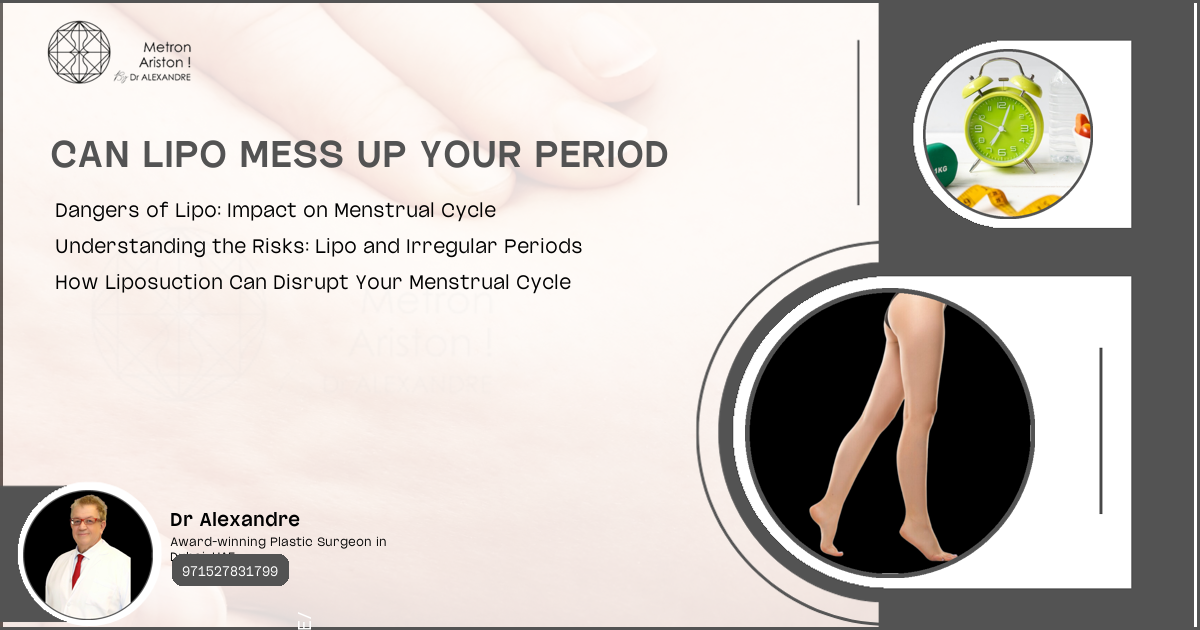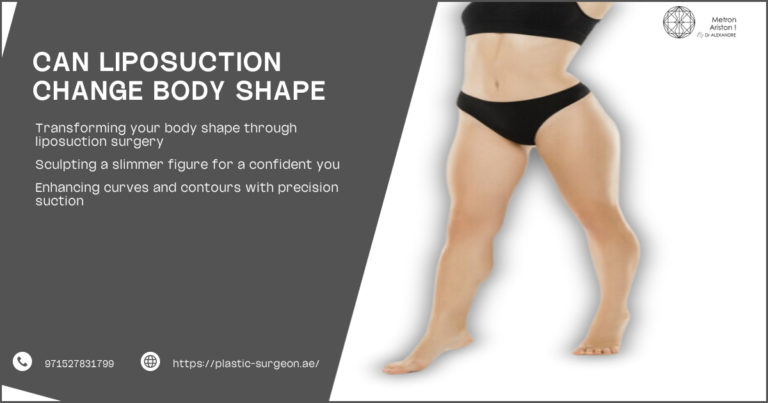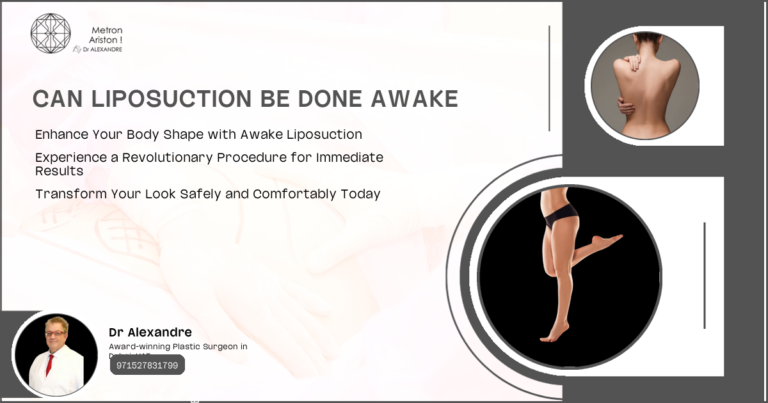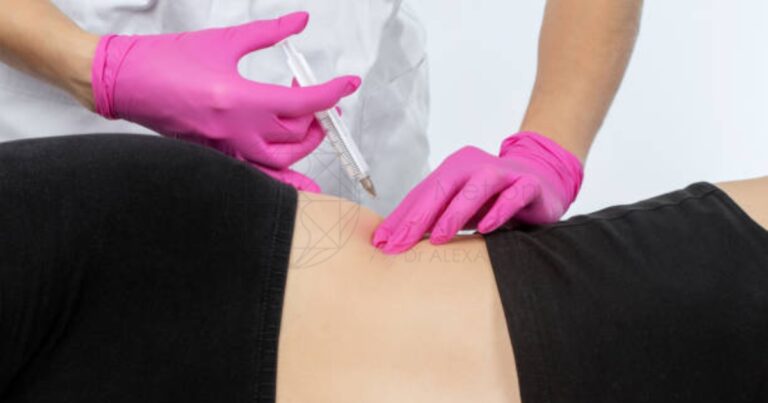Can Lipo Mess Up Your Period?
Can Liposuction Mess Up Your Period?
Liposuction, commonly referred to as lipo, is a popular cosmetic procedure that removes excess fat from specific areas of the body. While it can significantly enhance one’s appearance, many women wonder, “Can lipo mess up your period?” The answer is multifaceted, involving hormonal changes, stress, and alterations in body fat percentage.
Hormonal Changes After Liposuction
Liposuction can lead to hormonal changes in the body. Fat cells produce estrogen, and removing a significant amount of fat can disrupt this balance, leading to menstrual irregularities.
- Estrogen Production in Fat Cells : Fat cells are known to produce estrogen, a hormone crucial for regulating the menstrual cycle. When a large number of fat cells are removed, estrogen levels can drop, potentially causing irregular periods.
- Cortisol Levels and Stress Response : The body perceives surgery as a form of stress, which can elevate cortisol levels. High cortisol can interfere with the menstrual cycle, leading to delayed or missed periods.
- Thyroid Function and Metabolic Changes : Liposuction can also affect thyroid function, which plays a significant role in regulating metabolism and menstrual cycles. Disruptions in thyroid function can lead to menstrual irregularities.
Stress and Recovery Effects on Menstruation
The recovery period after liposuction can be stressful, both physically and emotionally. This stress can further impact menstrual regularity.
- Physical Stress : The body undergoes significant physical stress during and after liposuction, which can disrupt the menstrual cycle.
- Emotional Stress : Concerns about recovery and results can cause emotional stress, which can also affect menstrual regularity.
Body Fat Percentage and Menstrual Regularity
Body fat percentage plays a crucial role in menstrual regularity. A significant reduction in body fat can lead to menstrual irregularities.
- Impact on Estrogen Levels : Lower body fat can lead to reduced estrogen levels, causing irregular periods.
- Energy Balance : A significant reduction in body fat can disrupt the body’s energy balance, affecting the menstrual cycle.
How Liposuction Affects Hormonal Balance
Liposuction can have a profound impact on hormonal balance, affecting various hormones that regulate the menstrual cycle.
Estrogen Production in Fat Cells
Fat cells produce estrogen, and removing them can decrease estrogen levels. This decrease can cause menstrual irregularities, including delayed or missed periods.
- Reduced Estrogen Levels : Lower estrogen levels can lead to irregular periods.
- Impact on Menstrual Cycle : Changes in estrogen levels can cause changes in the menstrual cycle, including delayed or missed periods.
Cortisol Levels and Stress Response
The stress of surgery and recovery can elevate cortisol levels, which can interfere with the menstrual cycle.
- Elevated Cortisol Levels : High cortisol levels can disrupt the menstrual cycle.
- Impact on Menstrual Regularity : Elevated cortisol can lead to delayed or missed periods.
Thyroid Function and Metabolic Changes
Liposuction can affect thyroid function, which plays a significant role in regulating metabolism and menstrual cycles.
- Disrupted Thyroid Function : Changes in thyroid function can lead to menstrual irregularities.
- Impact on Metabolism : Disruptions in metabolism can affect the menstrual cycle.
Menstrual Irregularities Following Lipoplasty
Menstrual irregularities are common following liposuction, but they can vary in duration and severity.
Temporary vs. Long-term Effects
Most menstrual irregularities following liposuction are temporary, but some women may experience long-term effects.
- Temporary Irregularities : Most women experience temporary menstrual irregularities following liposuction.
- Long-term Effects : In some cases, menstrual irregularities may persist for a longer period.
Spotting and Breakthrough Bleeding
Spotting and breakthrough bleeding are common following liposuction and can be caused by hormonal changes.
- Common Occurrence : Spotting and breakthrough bleeding are common following liposuction.
- Caused by Hormonal Changes : Hormonal changes can lead to spotting and breakthrough bleeding.
Amenorrhea After Extensive Fat Removal
In rare cases, extensive fat removal can lead to amenorrhea or the absence of menstruation.
- Rare Occurrence : Amenorrhea is rare following liposuction.
- Caused by Extensive Fat Removal : Extensive fat removal can lead to amenorrhea.
Liposuction and Reproductive Health 
Liposuction can have implications for reproductive health, including fertility and pregnancy considerations.
Fertility Concerns Post-Procedure
Liposuction can affect fertility, particularly if it leads to significant hormonal changes.
- Impact on Fertility : Liposuction can affect fertility, particularly if it leads to significant hormonal changes.
- Consultation with Dr. Alexandre : It’s important to consult with a healthcare provider like Dr. Alexandre to discuss any fertility concerns.
Consultation with Dr. Alexandre for Personalized Advice
For personalized advice on reproductive health following liposuction, it’s important to consult with a healthcare provider like Dr. Alexandre.
- Personalized Advice : Consulting with a healthcare provider can provide personalized advice on reproductive health following liposuction.
- Importance of Consultation : It’s important to consult with a healthcare provider to discuss any concerns.
Recovery Timeline and Menstrual Cycle Normalization
The recovery timeline and normalization of the menstrual cycle can vary following liposuction.
Expected Duration of Menstrual Disruptions
Most menstrual disruptions following liposuction are temporary and resolve within a few months.
- Temporary Disruptions : Most menstrual disruptions are temporary and resolve within a few months.
- Expected Duration : The expected duration of menstrual disruptions can vary.
Factors Influencing Recovery Speed
Several factors can influence the speed of recovery and normalization of the menstrual cycle.
- Individual Factors : Individual factors, such as overall health and the extent of the procedure, can influence recovery speed.
- Lifestyle Factors : Lifestyle factors, such as diet and exercise, can also influence recovery speed.
Monitoring Menstrual Changes Post-Lipo
It’s important to monitor menstrual changes following liposuction and consult with a healthcare provider if any concerns arise.
- Importance of Monitoring : Monitoring menstrual changes can help identify any potential issues.
- Consultation with Healthcare Provider : It’s important to consult with a healthcare provider if any concerns arise.
Does liposuction affect hormones?
Liposuction can affect hormones, particularly estrogen and cortisol levels.
Hormonal Fluctuations During Recovery
Hormonal fluctuations are common during the recovery period following liposuction.
- Common Occurrence : Hormonal fluctuations are common during the recovery period.
- Impact on Menstrual Cycle : These fluctuations can impact the menstrual cycle.
Long-term Hormonal Impact of Fat Removal
The long-term hormonal impact of fat removal can vary, but most women experience a return to normal hormonal levels within a few months.
- Variable Impact : The long-term hormonal impact can vary.
- Return to Normal Levels : Most women experience a return to normal hormonal levels within a few months.
Can lipo mess up your period permanently?
In rare cases, liposuction can lead to prolonged menstrual disturbances, but most women experience temporary irregularities.
Rare Cases of Prolonged Menstrual Disturbances
Prolonged menstrual disturbances are rare following liposuction.
- Rare Occurrence : Prolonged menstrual disturbances are rare.
- Temporary Irregularities : Most women experience temporary irregularities.
Factors Contributing to Persistent Irregularities
Several factors can contribute to persistent menstrual irregularities following liposuction.
- Individual Factors : Individual factors, such as overall health and the extent of the procedure, can contribute to persistent irregularities.
- Lifestyle Factors : Lifestyle factors, such as diet and exercise, can also contribute to persistent irregularities.
How long after lipo does your period return to normal?
The timeframe for the menstrual cycle to return to normal can vary, but most women experience normalization within a few months.
Average Timeframe for Menstrual Cycle Stabilization
Most women experience a return to normal menstrual cycles within a few months following liposuction.
- Average Timeframe : The average timeframe for menstrual cycle stabilization is a few months.
- Temporary Disruptions : Most menstrual disruptions are temporary.
Individual Variations in Recovery
Individual variations in recovery can affect the timeframe for menstrual cycle normalization.
- Individual Factors : Individual factors, such as overall health and the extent of the procedure, can affect recovery.
- Lifestyle Factors : Lifestyle factors, such as diet and exercise, can also affect recovery.
Nutritional Considerations for Menstrual Health After Liposuction
Proper nutrition is crucial for maintaining menstrual health following liposuction.
Importance of Balanced Diet During Recovery
A balanced diet can support recovery and help maintain hormonal balance.
- Balanced Diet : A balanced diet is crucial for recovery and hormonal balance.
- Nutritional Support : Proper nutrition can support menstrual health.
Supplements to Support Hormonal Balance
Certain supplements can support hormonal balance and menstrual health following liposuction.
- Hormonal Balance : Supplements can support hormonal balance.
- Menstrual Health : Proper supplementation can support menstrual health.
Exercise and Physical Activity Post-Lipo
Exercise and physical activity can impact menstrual regularity following liposuction.
Safe Workout Routines During Recovery
It’s important to follow safe workout routines during the recovery period to avoid complications.
- Safe Workouts : Safe workout routines can support recovery.
- Avoiding Complications : Proper exercise can help avoid complications.
Impact of Exercise on Menstrual Regularity
Exercise can impact menstrual regularity, particularly during the recovery period.
- Impact on Menstrual Cycle : Exercise can impact the menstrual cycle.
- Supporting Recovery : Proper exercise can support recovery and menstrual health.
Psychological Effects of Liposuction on Menstrual Cycles
The psychological effects of liposuction can also impact menstrual cycles.
Body Image and Stress-Related Menstrual Changes
Concerns about body image and stress can lead to menstrual changes following liposuction.
- Body Image Concerns : Concerns about body image can lead to stress.
- Stress-Related Changes : Stress can impact the menstrual cycle.
Coping Strategies for Emotional Well-being
Coping strategies can help manage stress and support menstrual health following liposuction.
- Coping Strategies : Proper coping strategies can help manage stress.
- Emotional Well-being : Supporting emotional well-being can support menstrual health.
When to Seek Medical Attention for Menstrual Issues Post-Lipo
It’s important to know when to seek medical attention for menstrual issues following liposuction.
Red Flags and Warning Signs
Certain red flags and warning signs may indicate the need for medical attention.
- Red Flags : Certain symptoms may indicate the need for medical attention.
- Warning Signs : It’s important to be aware of warning signs.
Follow-up Appointments with Dr. Alexandre
Follow-up appointments with a healthcare provider like Dr. Alexandre can help address any concerns.
- Follow-up Appointments : Follow-up appointments can help address concerns.
- Importance of Consultation : Consulting with a healthcare provider is important.
Does liposuction affect hormones?
Liposuction can affect hormones, particularly estrogen and cortisol levels.
Hormonal Fluctuations During Recovery
Hormonal fluctuations are common during the recovery period following liposuction.
- Common Occurrence : Hormonal fluctuations are common during the recovery period.
- Impact on Menstrual Cycle : These fluctuations can impact the menstrual cycle.
Long-term Hormonal Impact of Fat Removal
The long-term hormonal impact of fat removal can vary, but most women experience a return to normal hormonal levels within a few months.
- Variable Impact : The long-term hormonal impact can vary.
- Return to Normal Levels : Most women experience a return to normal hormonal levels within a few months.
Can lipo mess up your period permanently?
In rare cases, liposuction can lead to prolonged menstrual disturbances, but most women experience temporary irregularities.
Rare Cases of Prolonged Menstrual Disturbances
Prolonged menstrual disturbances are rare following liposuction.
- Rare Occurrence : Prolonged menstrual disturbances are rare.
- Temporary Irregularities : Most women experience temporary irregularities.
Factors Contributing to Persistent Irregularities
Several factors can contribute to persistent menstrual irregularities following liposuction. Pneumatic fat removal uses air pressure to suck out unwanted fat from the body It is a way to shape the body without cutting the skin like in surgery Liposuction ineffective hipshape means removing fat from hips doesn’t always give the desired shape Some people may still have uneven hips after
Alcohol post liposuction Drinking alcohol after liposuction can be dangerous and slow down healing It’s best to avoid alcohol for a few weeks after the surgery to help your body recover faster
- Individual Factors : Individual factors, such as overall health and the extent of the procedure, can contribute to persistent irregularities.
- Lifestyle Factors : Lifestyle factors, such as diet and exercise, can also contribute to persistent irregularities.
How long after lipo does your period return to normal?
The timeframe for the menstrual cycle to return to normal can vary, but most women experience normalization within a few months.
Average Timeframe for Menstrual Cycle Stabilization
Most women experience a return to normal menstrual cycles within a few months following liposuction.
- Average Timeframe : The average timeframe for menstrual cycle stabilization is a few months.
- Temporary Disruptions : Most menstrual disruptions are temporary.
Individual Variations in Recovery
Individual variations in recovery can affect the timeframe for menstrual cycle normalization.
- Individual Factors : Individual factors, such as overall health and the extent of the procedure, can affect recovery.
- Lifestyle Factors : Lifestyle factors, such as diet and exercise, can also affect recovery.
Frequently Asked Questions:
Can lipo affect the menstrual cycle?
Yes, liposuction can affect the menstrual cycle. The removal of fat tissue can lead to hormonal changes, potentially causing temporary or long-term menstrual irregularities. It is essential to monitor any changes and consult a healthcare professional if concerns arise.
How long do menstrual changes last after liposuction?
The duration of menstrual changes after liposuction can vary. Some women may experience changes for only a few cycles, while others may have longer-lasting effects. If menstrual irregularities persist for more than six months, it is advisable to seek medical advice.
Is it safe to undergo liposuction if I have a hormonal condition?
Women with pre-existing hormonal conditions should consult a healthcare professional before undergoing liposuction. Conditions such as PCOS or thyroid disorders can influence the menstrual effects of liposuction, and personalized guidance is essential for safe and effective treatment.
Can liposuction impact my fertility?
Liposuction can potentially impact fertility by influencing hormone levels. Women planning to conceive should consider the timing of the procedure and consult a healthcare professional to discuss potential impacts and receive personalized guidance.
How can I maintain the results of liposuction?
Maintaining the results of liposuction requires adopting healthy lifestyle changes. Follow a balanced diet, engage in regular physical activity, and manage stress to support long-term results and overall well-being.








